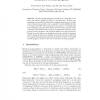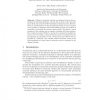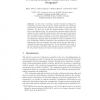113
Voted
LPNMR
1999
Springer
15 years 7 months ago
1999
Springer
We introduce choice logic programs as negation-free datalog programs that allow rules to have exclusive-only (possibly empty) disjunctions in the head. Such programs naturally mod...
145
Voted
LPNMR
1999
Springer
15 years 7 months ago
1999
Springer
Abstract. Revision programming was introduced as a formalism to describe and enforce updates of belief sets and databases. Revision programming was extended by Fitting who assigned...
139
Voted
LPNMR
1999
Springer
15 years 7 months ago
1999
Springer
This paper continues the line of research on representing actions, on the automation of commonsense reasoning and on planning that deals with causal theories and with action langua...
116
Voted
LPNMR
1999
Springer
15 years 7 months ago
1999
Springer
Recently there has been increased interest in logic programming-based default reasoning approaches which are not using negation-as-failure in their object language. Instead, defau...
167
Voted
LPAR
1999
Springer
15 years 7 months ago
1999
Springer
Abstract. Description Logics (DLs) are a family of knowledge representation formalisms mainly characterised by constructors to build complex concepts and roles from atomic ones. Ex...
129
Voted
LPAR
1999
Springer
15 years 7 months ago
1999
Springer
Abstract. Walther’s estimation calculus was designed to prove the termination of functional programs, and can also be used to solve the similar problem of proving the well-founde...
115
Voted
LPAR
1999
Springer
15 years 7 months ago
1999
Springer
In this paper we explore the use of ellipsis in proofs about lists. We present a higher-order formulation of elliptic formulae, and describe its implementation in the λClam proof ...
125
Voted
LPAR
1999
Springer
15 years 7 months ago
1999
Springer
In this work, we develop a partial evaluation technique for residuating functional logic programs, which generalize the concurrent computation models for logic programs with delays...
104
Voted
LOPSTR
1999
Springer
15 years 7 months ago
1999
Springer
Abstract. A formal and effective approach to the extension of the computational behaviour of logic programs is presented. The approach builds upon the following concepts. The exte...
112
Voted
LOPSTR
1999
Springer
15 years 7 months ago
1999
Springer
Abstract. A concept of annotations for rendering procedural aspects of Prolog is presented, built around wellknown procedural concepts of Standard Prolog. Annotations describe prop...



